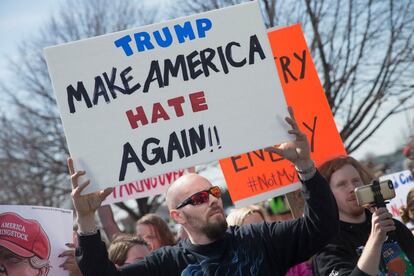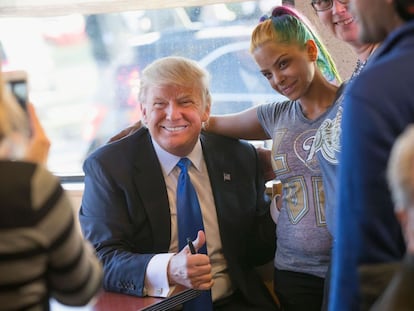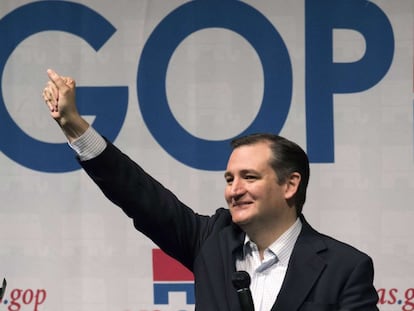Donald Trump’s distorted image of the United States
Vision of a country verging on revolt jars with strong economy and popular president


The United States is not Donald Trump. And while that may seem a truism, we should remember that the property mogul’s victories in the Republican primaries project the image of a country on the verge of recession and ready to revolt against the oligarchy represented by Washington. Quite simply, this is not the case.
Despite growing inequality, the US economy has fared better than most around the world after the recession of the past decade. Furthermore, Trump is unpopular even in his own country, much more so than the man who embodies the status quo: President Barack Obama.
The head of state has made it clear he believes Trump is hurting the country’s image abroad. “I am getting questions constantly from foreign leaders about some of the wackier suggestions that are being made,” Obama told reporters on Tuesday.
I am getting questions constantly from foreign leaders about some of the wackier suggestions that are being made President Obama
The queries came at the Nuclear Security Summit in Washington last week, held following Trump’s comments that it would be a good idea for US allies in Asia – Japan and South Korea – to have nuclear weapons. A few days later President Obama met with North Atlantic Treaty Organization (NATO) Secretary General Jens Stoltenberg, a meeting the press interpreted from Trump’s perspective.
The Republican primary candidate was also the elephant in the room during Obama’s recent trip to Cuba and Argentina. His xenophobic tirades against Muslims and Latino immigrants reaffirm the worst caricatures of America: ignorant, vulgar, white, boastful, violent, nationalist and racist. In short, Trump projects an image of the United States as a country where the masses are furious with the elites and ready to deliver a death blow to the system at the upcoming presidential elections.
In reality, unemployment has declined by half since Obama’s first year in office. Joblessness has fallen from 10% in 2009 to 5% today. Over the same period, the private sector has created 10 million jobs, while more than 20 million people previously without healthcare now have medical coverage thanks to the Obama administration. In 2009, there were 186,000 American soldiers in Iraq and Afghanistan: today there are about 15,000. Furthermore, the country has been free from major terrorist attacks for 15 years.
Dr Lynn Vavreck, a professor of political science at the University of California Los Angeles last week wrote in The New York Times that in 2015 the misery index — a combined measure of unemployment and inflation — was about as low as it had been since the 1950s, while consumer confidence in the economy was as positive as it had been in the mid-2000s and mid-1980s, and that there have been no major changes in general overall happiness over the last 40 years.
We are allowing a wildly and destructively inaccurate portrait of us as a people to dominate our imaginations and debase our thinking E. J. Dionne in ‘The Washington Post’
“Describing Americans’ mood as distinctively angry in 2015 elides this evidence,” Vavreck writes, adding that the discontent that has fueled the Trump campaign is a sign of political polarization and racism – the idea being that Obama, the nation’s first African American president is very popular among Democrats and very unpopular among Republicans.
As E. J. Dionne writes in The Washington Post, if people had lost confidence in their institutions, the president wouldn't be enjoying a 53% approval rating. By this point in his second term, former President George W. Bush had a 32% approval rating. “We are allowing a wildly and destructively inaccurate portrait of us as a people to dominate our imaginations and debase our thinking,” Dionne wrote.
The presidential elections are still seven months away, but the polls suggest Trump would find it very hard to defeat Hillary Clinton if he manages to secure the Republican nomination. Seventy-five percent of female voters, more than half the voting population, along with the majority of Latinos and African Americans, oppose him.
Few candidates could be more representative of the establishment than the former secretary of state, and yet Clinton is the frontrunner in the Democratic primaries race. This is a woman who has either been in office, or very visibly supporting her husband’s career since the 1970s, yet she has received 9.1 million votes during the primaries so far; 7.9 million voters have chosen Trump.
Trump’s greatest victory in the primaries has not been in a state battered by the economic crisis, but instead in Massachusetts, one of the most prosperous areas in the world
As for the link between America’s economic woes and support for Trump, that’s tenuous at best. Trump’s greatest victory in the primaries has not been in a state battered by the economic crisis, but instead in Massachusetts, one of the most prosperous areas in the world.
It’s true that the United States faces profound challenges. Salaries have not increased in years and growing income disparity over the last four decades has devastated the middle classes, while outsourcing has hit the working class hard. But these are setbacks that have affected whites as well as minorities. In terms of prison and unemployment rates, African Americans and Hispanics have more reasons to be angry than the rest of the United States. Yet they are voting for the Democratic Party, for Clinton. Some, fewer, are voting for the other Democratic contender, Bernie Sanders, who has responded to their discontent with a protectionist message not dissimilar to Trump’s. At the same, they are, to use a word Trump likes to employ, “massive” fans of President Obama.
English version by Dyane Jean François.
Tu suscripción se está usando en otro dispositivo
¿Quieres añadir otro usuario a tu suscripción?
Si continúas leyendo en este dispositivo, no se podrá leer en el otro.
FlechaTu suscripción se está usando en otro dispositivo y solo puedes acceder a EL PAÍS desde un dispositivo a la vez.
Si quieres compartir tu cuenta, cambia tu suscripción a la modalidad Premium, así podrás añadir otro usuario. Cada uno accederá con su propia cuenta de email, lo que os permitirá personalizar vuestra experiencia en EL PAÍS.
En el caso de no saber quién está usando tu cuenta, te recomendamos cambiar tu contraseña aquí.
Si decides continuar compartiendo tu cuenta, este mensaje se mostrará en tu dispositivo y en el de la otra persona que está usando tu cuenta de forma indefinida, afectando a tu experiencia de lectura. Puedes consultar aquí los términos y condiciones de la suscripción digital.










































